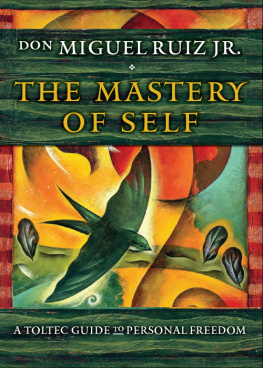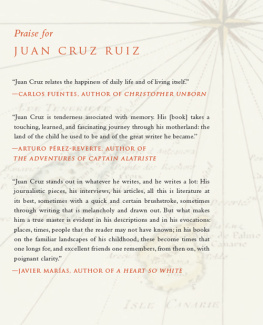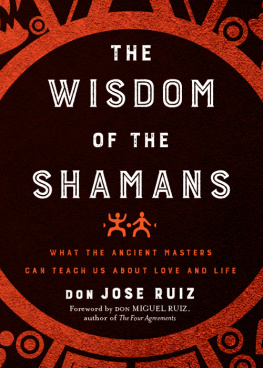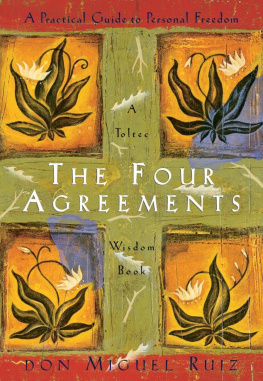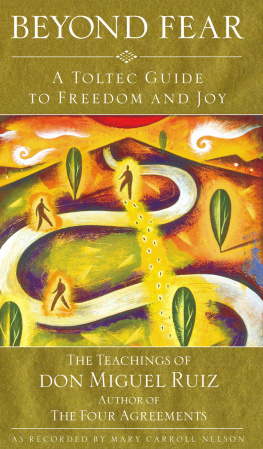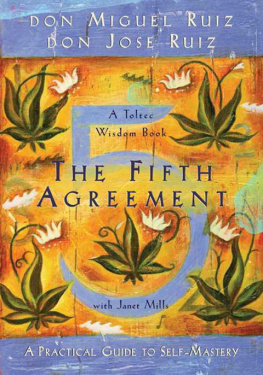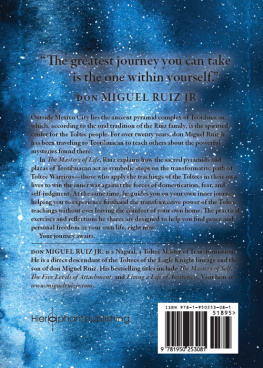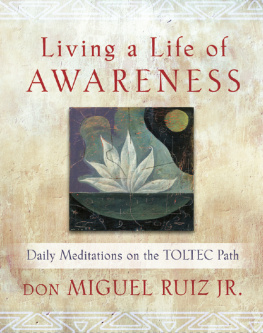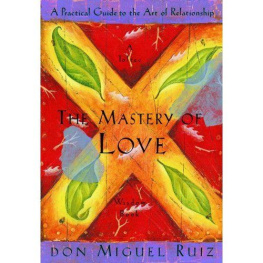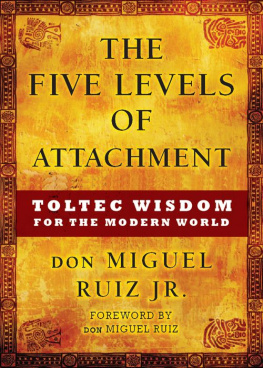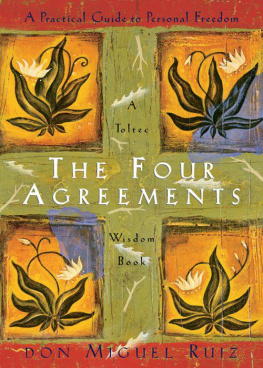Ruiz - The mastery of self: a Toltec guide to personal freedom
Here you can read online Ruiz - The mastery of self: a Toltec guide to personal freedom full text of the book (entire story) in english for free. Download pdf and epub, get meaning, cover and reviews about this ebook. City: San Antonio;TX, year: 2016, publisher: Hierophant Publishing, genre: Religion. Description of the work, (preface) as well as reviews are available. Best literature library LitArk.com created for fans of good reading and offers a wide selection of genres:
Romance novel
Science fiction
Adventure
Detective
Science
History
Home and family
Prose
Art
Politics
Computer
Non-fiction
Religion
Business
Children
Humor
Choose a favorite category and find really read worthwhile books. Enjoy immersion in the world of imagination, feel the emotions of the characters or learn something new for yourself, make an fascinating discovery.
The mastery of self: a Toltec guide to personal freedom: summary, description and annotation
We offer to read an annotation, description, summary or preface (depends on what the author of the book "The mastery of self: a Toltec guide to personal freedom" wrote himself). If you haven't found the necessary information about the book — write in the comments, we will try to find it.
Ruiz: author's other books
Who wrote The mastery of self: a Toltec guide to personal freedom? Find out the surname, the name of the author of the book and a list of all author's works by series.
The mastery of self: a Toltec guide to personal freedom — read online for free the complete book (whole text) full work
Below is the text of the book, divided by pages. System saving the place of the last page read, allows you to conveniently read the book "The mastery of self: a Toltec guide to personal freedom" online for free, without having to search again every time where you left off. Put a bookmark, and you can go to the page where you finished reading at any time.
Font size:
Interval:
Bookmark:
Copyright 2016
by don Miguel Ruiz Jr.
All rights reserved, including the right to reproduce this work
in any form whatsoever, without permission in writing from the
publisher, except for brief passages in connection with a review.
Cover design by Emma Smith
Cover art Nicholas Wilton | Illustration Source
Interior by Frame25 Productions
Hierophant Publishing
8301 Broadway, Suite 219
San Antonio, TX 78209
888-800-4240
www.hierophantpublishing.com
If you are unable to order this book from your local bookseller, you may order directly from the publisher.
Library of Congress Cataloging in Publication data has been applied for.
ISBN: 978-1-93828-953-8
10 9 8 7 6 5 4 3 2 1
Printed on acid-free paper in the United States of America
To all whom I love.
Emancipate yourself from mental slavery;
none but ourselves can free our minds.
Bob Marley
A moment of clarity without any action is just a thought that
passes in the wind. But a moment of clarity followed by an
action is a pivotal moment in our life.
don Miguel Ruiz Jr.
How This Book Came into Being
Know Thyself
These were the words inscribed at the entrance of the Temple of Apollo, home of the Oracle of Delphi, arguably the most famous woman in all of Ancient Greece. History tells us that thousands upon thousands of people, including kings, queens, statesmen, philosophers, and common people alike, would travel hundreds of miles or more to receive her prophetic guidance every year. The temple itself was a towering structure that reached its pinnacle of influence in the middle centuries of the first millennia BCE. At the time, it was considered the most important religious shrine in all of Greece.
Building a massive temple like this, even with our advanced machinery and modern technology, would still be a major undertaking by today's standards. Modern architects marvel at the intelligence, craftsmanship, and labor that went into creating this temple, but I find it more fascinating that of all the messages that could have been written at its entrance, the two-word axiom Know Thyself was chosen. Perhaps the oracle wanted to be sure that if you remembered only one message from your pilgrimage, then knowing yourself should be it. I often wonder what the world would look like today if some of our modern religions taught that self-knowledge, rather than blind adherence to external guidance and dogma, was the paramount goal of the spiritual path.
Not long after the zenith of the oracle, and on the other side of the world, a group of people came together to form a new civilization in what is now south central Mexico. They called themselves Toltec, which means artist. But these people were not artists in the traditional sense (although some were painters and sculptors also); rather, they saw themselves as artists of life, and the world we inhabit as the canvas upon which they painted their masterpiece. The legacy of the Toltecs and their teachings has been handed down from generation to generation, often in secrecy when the politics of the day required it, and don Miguel Ruiz Jr. is the latest teacher in the Eagle Knight lineage of the Toltec people.
When Miguel approached me about writing a book on self-mastery, I couldn't help but think of the Oracle of Delphi and her 2,500-year-old instruction to Know Thyself. I wondered how this sage advice would appear in the context of his Toltec ancestry. The book you are holding now, I am pleased to say, conveys exactly thisand much, much more. Miguel presents ancient wisdom in a modern way, and helps us to apply this timeless truth of Know Thyself in our everyday lives.
In the opening chapters, Miguel lays the groundwork for the book, providing a framework based on his Toltec tradition. He explains how the events and actions of your past have shaped your present reality. The following chapters are where he really digs in, giving you the tools you need to discover who you are at the deepest level, uncover any self-limiting beliefs you have falsely accepted as fact, and release any attachments you are holding that continuously drag you down. The later chapters will help you chart a new course to where you really want to go, which for some of you may be a very different place than where you are currently heading.
Miguel has stressed to me on many occasions that it's not enough to just read the information contained in these pages; it's when you choose to incorporate this knowledge into your life that you receive the benefits. To this aim, he has included exercises at the end of many chapters that are designed to help you do just that. Returning to the Greek world for a moment, we can say that the exercises are where logos (knowledge) becomes praxis (practice)or, as Miguel writes, understanding the teachings is the first step, but applying them is what makes you a Master.
So without further ado, it is with great pleasure that I present to you don Miguel Ruiz Jr.'s The Mastery of Self. May it serve you well on your journey of self-discovery.
Randy Davila
Publisher
Hierophant Publishing
AllyThe voice of your internal narrator when it inspires you to live, create, and love unconditionally. The ally can also offer constructive self-talk.
AttachmentThe action of taking something that is not a part of you and making it a part of you through an emotional or energetic investment. You can attach to external objects, beliefs, ideas, and even roles you play in the world.
Authentic SelfThe Divine inside of you; the force that gives life to your mind and your body. It's similar to the concept of the spirit or the soul that is present in many religious traditions, but it's not exactly the same.
AwarenessThe practice of paying attention in the present moment to what is happening inside your body and your mind as well as in your immediate surroundings.
DomesticationThe primary system of control in the Dream of the Planet. Starting when we are very young, we are presented with either a reward or a punishment for adopting the beliefs and behaviors of what others find acceptable. When we adopt these beliefs and behaviors as a result of either the reward or punishment, we can say we have been domesticated.
Dream of the PlanetThe combination of every single being in the world's Personal Dream, or the world we live in.
NarratorsThe voices in your mind that speak to you throughout the day, which can be either positive (ally) or negative (parasite).
ParasiteThe voice of the narrator when it uses your beliefs, formed through domestication and attachment, to hold power over you by placing conditions on your self-love and self-acceptance. This negative voice causes sadness, anxiety, and fear.
Personal DreamThe unique reality created by every individual; your personal perspective. It is the manifestation of the relationship between your mind and body.
Toltec peopleAn ancient group of Native Americans who came together in south and central Mexico to study perception. The word Toltec means artist.
Toltec warriorOne who is committed to using the teachings of the Toltec tradition to win the inner battle against domestication and attachment.
IMAGINE FOR A MOMENT that you are in a dream.
In this dream, you find yourself at a huge party with thousands of people, where you are the only sober person and everyone else is drunk. The other partygoers are in varying states of intoxication. A few people have had just one or two drinks and are only tipsy; most fall into the realm of general drunkenness; and a handful are so drunk that they are making spectacles of themselves in all sorts of colorful ways. They may even have blacked out, as their actions seem completely out of their control.
Next pageFont size:
Interval:
Bookmark:
Similar books «The mastery of self: a Toltec guide to personal freedom»
Look at similar books to The mastery of self: a Toltec guide to personal freedom. We have selected literature similar in name and meaning in the hope of providing readers with more options to find new, interesting, not yet read works.
Discussion, reviews of the book The mastery of self: a Toltec guide to personal freedom and just readers' own opinions. Leave your comments, write what you think about the work, its meaning or the main characters. Specify what exactly you liked and what you didn't like, and why you think so.

